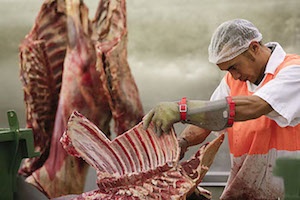Possible meat tax in Latvia: what is known about it?

In recent years, the topic of ecology and sustainable development has become increasingly relevant in Europe. One of the most discussed issues is the introduction of a MEAT tax , which may become a reality not only in Latvia, but also in other EU countries . In 2023, meat consumption in Latvia reached significant volumes: 78,000 tons of pork, 67,000 tons of poultry and 11,500 tons of beef. These figures raise concerns among environmentalists, as meat production is associated with high levels of greenhouse gas emissions.
The idea of a meat tax
According to reports, a meat tax may be introduced as part of the Green Deal, a strategy aimed at reducing the negative impact on the environment. One of the proposals is to limit meat consumption to 16 kilograms per person per year. This has caused a wide resonance among citizens, many of whom have begun to express their dissatisfaction.
Henriks Danusevich, President of the Latvian Traders Association, in particular, was one of the first to raise this issue on social media. He claims that the meat tax will be adopted by the new convocation of the European Parliament within three to five years. However, his words have raised many questions and confusion, as the Latvian Ministry of Agriculture has denied that such plans already exist.
The reaction of the authorities The Latvian Ministry of Agriculture has officially stated that at the moment, the introduction of a meat tax is not a real prospect. The agency noted that studies
are currently being conducted at the OECD and European Commission level on the possibilities of introducing a tax on greenhouse gas emissions in agriculture. However, there are no specific plans to introduce a "meat tax" in the coming years. Nevertheless, Danusevich does not back down from his words and claims that his statements were misinterpreted. He emphasizes that the issue of a meat tax remains relevant and will continue to be discussed. Environmental and social aspects The introduction of a meat tax can have both positive and negative consequences. On the one hand, it can contribute to a decrease in meat consumption and, as a result, a decrease in greenhouse gas emissions. On the other hand, such a move could cause discontent among the population, especially among those who consider meat an important part of their diet. In addition, a meat tax could negatively affect agriculture, especially small farms that depend on the sale of meat products. It is important to consider that changing consumer habits takes time and a comprehensive approach, including educating the population about healthy eating and sustainable development.
The meat tax in Latvia and Europe as a whole continues to be a hotly debated topic. Although there are currently no official plans to introduce it, the issue of the need to limit meat consumption and move to more sustainable forms of nutrition remains relevant. It is important that this issue be discussed in an open dialogue between government agencies, producers and consumers in order to find an optimal solution that takes into account both environmental and social aspects.
Read together with it:
- An HSE expert reported on the "evolution of inequality" in access to healthcare.An HSE researcher analyzed Russians' access to healthcare over a ten-year period. In 2021, the influence of financial factors became noticeable for the first time: low income reduces the likelihood of visiting a DOCTOR.Over the ten years from 2011 to 2021, the number of Russians requiring medical care but not receiving it remained virtually unchanged, according to a study by Lyudmila Zasimova, hea...
- Низкое предложение и устойчивый спрос: в Аргентине растут цены на мясоЦены на говядину снова выросли, что отразилось на полках супермаркетов и в мясных магазинах. За последние две недели розничные цены выросли на 8–12%, а на некоторые популярные отрубы рост превысил 15% по сравнению с октябрем. Тем не менее, продажи остаются высокими: потребители продолжают покупать, принимая новые цены и закрепляя тенденцию, которая повторяется каждый год в конце года, когда спрос ...
- Смоленская область — лидер России по производству крольчатиныВ интервью «Агроэксперту» заместитель председателя регионального правительства Алексей Кучумов отметил, что регион достиг самодостаточности по таким продуктам, как яйца, мясо и картофель, превышая уровень 100%. Кроме того, Смоленская область занимает первое место по посевным площадям льна, а также активно развивает молочное животноводство, с общим поголовьем более 1......
- Pharmaceutical companies see a threat to EU security due to bacteria in UkraineAntibiotic-resistant superbugs have been detected in Ukrainian soldiers since the beginning of the conflict, and now they pose a threat to Europe, according to a foundation developing antibiotics.The Ukrainian conflict threatens Europe with antibiotic-resistant "superbugs," said Henry Skinner, CEO of the AMR Action Fund, which specializes in investing in antimicrobials. His article was published o...
- В Амурскую область поступило свыше 6 тысяч тонн мяса птицы из КитаяС 3 июня по 6 ноября инспекторы проверили 290 партий мяса, все из которых были сопровождены ветеринарными сертификатами, подтверждающими их качество и безопасность. Лабораторные исследования, проведенные под контролем Россельхознадзора, не выявили нарушений, и груз был допущен на территорию России.


